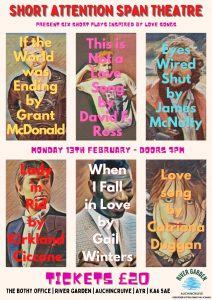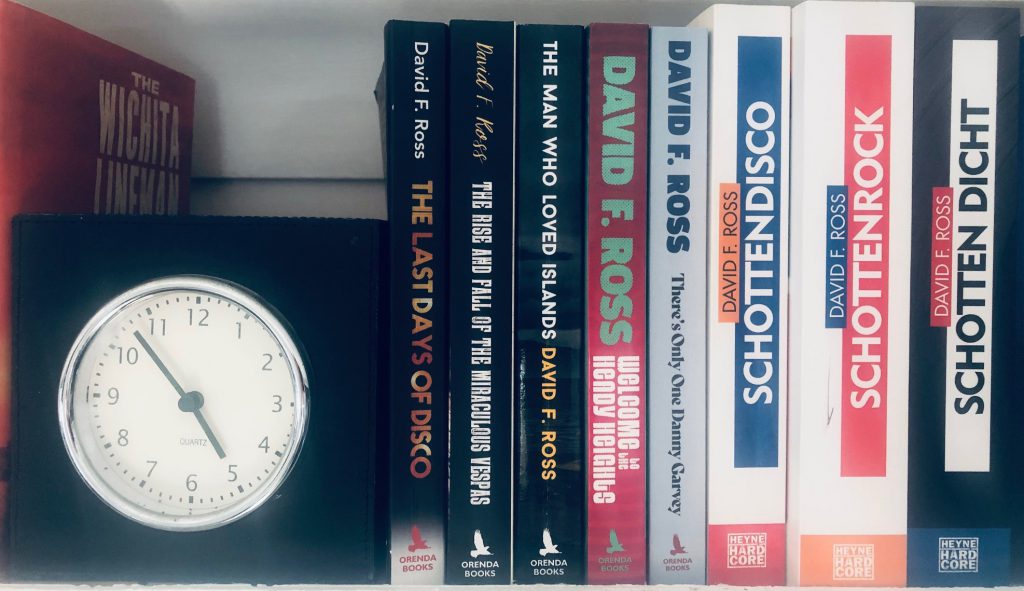I didn’t read a lot as a child. Mine wasn’t family background that encouraged reading. I do not recall there being books in our house and perhaps as a result, I was always more interested in other things: music and football, mainly. Time being the most valuable commodity there is, ideas for my own writing now – and the things that inspire me creatively – still usually come from other sources; from visual media and, as the quoted reviewer above has accurately pinpointed, from music. I am someone who gets bored easily and I am also very impatient. Books that lack immediacy or any discernible pace are unlikely to last the distance with me. I have too many half-read novels – and half-written ones, come to that – lying around the house already. Commitment issues, as I believe it is now commonly described. However, I am now trying to make up for my much younger self’s indifference to literature.
I was around 16 or 17 years old when I started to become more interested in certain books. Unsurprisingly, that interest was prompted by the musicians I was obsessed with at the time. Paul Weller, Joe Strummer, and Elvis Costello were songwriters who regularly referenced authors like George Orwell, whose books I had rather reluctantly read in earlier school days. But it was Morrissey who opened a whole spectrum of literature to me. The personal impact of the early Smiths singles is still hard to underestimate. I had honestly never heard anything like them before. Of course, as time passed, I would boastfully claim to disinterested fellow Glasgow School of Art students that I first heard of The Smiths as early as May 1983, when that now legendary first John Peel session was broadcast. Days after, ‘Hand in Glove’ was released as the band’s first single to a generally muted reception. Five months later though ‘This Charming Man’ felt to me what ‘Heartbreak Hotel’ must have felt like to millions of previously repressed and directionless American teenagers.
There was something immediately unique about Morrissey. He looked like an amalgam of Elvis Presley, James Dean and Albert Seaton. But he wore ordinary if slightly antiquated clothes like those that could be found (and subsequently altered) in your dad’s wardrobe. His words had an archaic sonority which hinted at more literary reference points with clever and witty lyrics laced with arch references to Shelagh Delaney’s writing, or Oscar Wilde, or even the American beat poets.
Morrissey created powerful vignettes of life in working-class contexts that I knew and understood; of relationships that were framed and informed by social context and limited opportunities. I could easily visualise the grime of the red-brick back courts of Northern England and the small, terraced houses of Salford or Hulme or Moss Side where Morrissey’s asexual perspective was set. He described the lives of angry young men, the longing of directionless lonely teenagers, and the absurdity of the Monarchy and – at a time of self-interested and brutal Thatcherism – they spoke to me more directly than any other written material had. Morrissey’s lyrics were a magical mystery tour of his own literary influences, and gradually, they also became mine.
The Blinder by Barry Hines is a typically northern story of a young footballer Lennie Hawk, whom many supporters considered to be the reincarnation of another flawed genius from his club’s past. Lennie Hawk had it all. He was handsome, charming, intelligent, quick-witted and a footballing genius. And he was still only 17. But it would all end badly as he burned the candle at both ends. The book reflects the social values of the early ‘60s when it was written. Lennie and his mum lived in one of those tiny, terraced houses with its living room opening onto the street at the front and sharing the same cramped space as the kitchen at the back. The text remains fresh to me and is a fantastic reminder of simpler times when the local sporting heroes still played for their local team and drank with the supporters in the local pubs after the game. Although set two decades later, my first novel owes an enormous debt to The Blinder, in the way that it captures the hopes and dreams of young people who, despite mounting political, social, and family pressures, still appreciate that the world is at their feet, and with that fleeting feeling that it is theirs for the taking.
I loved this book and it led me to A Kestrel for A Knave by the same author, and the outstanding Billy Liar by Keith Waterhouse. Perhaps the perfect adaptation, the film of this book had a long-lasting effect on me. It painted a monochromatic picture of a country struggling to come to terms with the end of Empirical power in the wake of two devastating wars. Everyone in Billy Fisher’s world is trapped by these circumstances, apart from Liz, the beatnik girl he adores, played by Julie Christie. She represents freedom; an escape from a life of pram-pushing drudgery or factory conditioning. Billy Liar’s influence on The Last Days of Disco is never very far from the surface.
The books of my favourite authors all come from a similar character-driven place as Morrissey’s lyrics. If Bob Dylan’s songs read like novellas, Morrissey’s are like script synopses for the BBC’s Play For Today series from the late 60s and early 70s. As an extension of those kitchen-sink dramas, Irvine Welsh and John Niven continue to be important reference points for me, especially in terms of authentic, socially realistic characterisation. Irvine Welsh – and Trainspotting especially – has changed the way the Scottish literary voice is appreciated around the world. John Niven is also from an Ayrshire background and his books – specifically The Amateurs – demonstrated that small-town everyday life could be brutally funny.
Roddy Doyle is an absolute master of this kind of writing and the believability of the characters and the way they speak to – and interact with – each other is genius. Jonathan Coe also creates fantastic characters and directly relates their multiple storylines to the cultural and political events of the time. The subtext of my first published books merely reflects my attempts to write something approaching the social commentary backbone of The Rotter’s Club. Although this may surprise them, I see traces of reference in their work to songs like ‘This Night Has Opened My Eyes’ or ‘Rusholme Ruffians’ or ‘The Queen Is Dead’. And my record collection remains highly influential in my writing, as acknowledged by the playlist appendix in each book.
Reading is a route to a different you; one that is better informed, more creative, and hopefully more understanding and tolerant of others. Regardless of how you find your way into the world of books – whether through music and lyrics, television adaptations or a natural attraction – you will find it the most rewarding place if you give yourself to it.
Good luck and remain curious.



